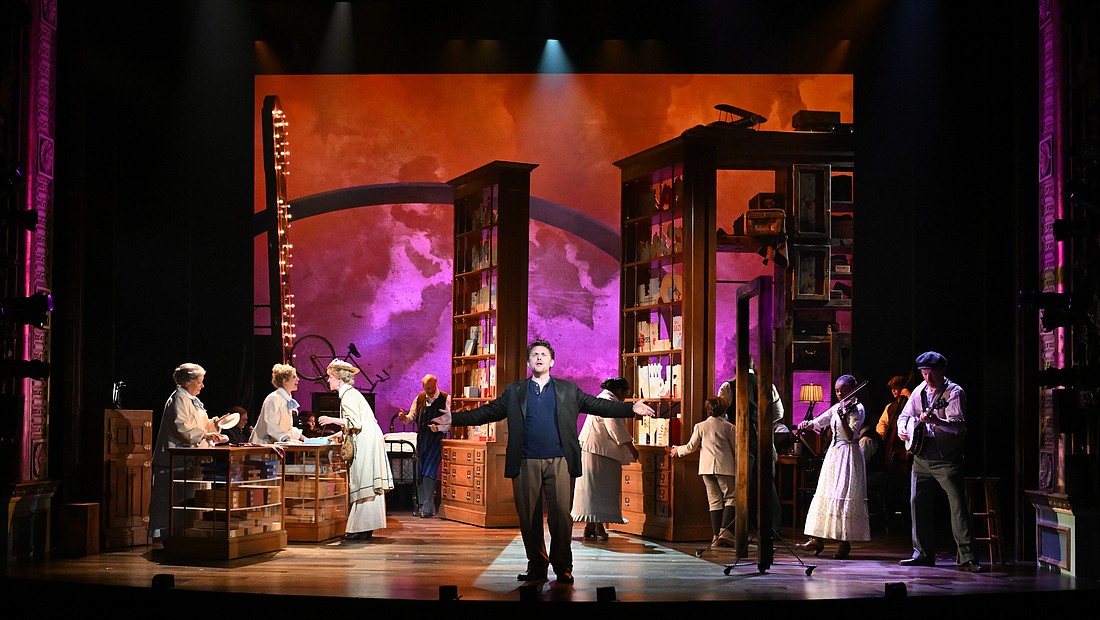- February 7, 2026
-
-
Loading

Loading

After a two-year delay, “Knoxville” is finally on stage in an Asolo Rep premiere production. The musical is an adaptation of James Agee’s “A Death in the Family,” with some material from Tad Mosel’s first theatrical adaptation.
It’s the brainchild of composer Stephen Flaherty, lyricist Lynn Ahrens, and playwright Frank Galati, who also directs. They’re the creative team behind “Ragtime” and clearly know what they’re doing.
Here’s a short plot synopsis. A mere X-Ray — the bones alone.
Like the novel it’s based on, “Knoxville” is the story of an imaginative 6-year-old boy dealing with his father’s death in a stupid automobile accident. The kid’s mother is a devout Catholic; his father is (or was) agnostic.
The kid’s religious side fears his father’s damnation. The cynical side (created in his father’s image) thinks religion might be hokum for suckers. Is Dad in hell? Or is there no such thing as heaven or hell … or God either?
The novel’s central character wrestles with these questions.
The musical’s young hero does too — without making the questions explicit.
For Agee, those questions weren’t academic. His original novel told the truth with fiction.
He based “A Death in the Family” on his own childhood in Knoxville, TN in the early 1900s. The trauma at the heart of the story broke his heart in real life. Getting it down on paper was a struggle. “Knoxville” deftly captures that fight.
This is clearly a memory play. The adult Agee, played by Jason Danieley, is present on stage as events unfold.
He begins (author that he is) by trying to bang out the story on a typewriter, and ripping out his first draft in frustration. (An accurate reflection of Agee’s process.)
From there, he calms down and peels back the years. (In the mind’s eye, you can go home again.) As this is a voyage in the author’s mind, the memories aren’t fixed scenes like so many home movies. The author is imagining as much as remembering.
The musical’s creators brilliantly evoke Agee’s mental time travels. His novel changed the real-life characters’ names. (James Agee became Rufus Follett, etc.) But it’s clearly Agee’s story. The musical is too, but it’s also the story of an author recapturing lost time.
So, like Scrooge haunting his own past, the adult Agee revisits his childhood home. His younger incarnation Rufus (Jack Casey) fears nothing and dreams of wearing a big boy’s cap (“and not a hat like a baby”); his religious mother Mary (Hannah Elless), scorns Charlie Chaplin’s rude movies; his Aunt Hannah (Ellen Harvey) solves every problem with shopping. His agnostic father Jay (Paul Alexander Nolan) is loving but untamed. And there are hints his wild side could get wilder, especially when he drinks.
Each actor delivers a strong performance. No actor is an island, here. Their characters are all part of a community, and they never let you forget it. That network of relationships is baked into the original novel.
Agee’s story transcends the author. He didn’t stop with “What happened to me?” or “What happened to my father?”
He moved on to, “What happened to my neighbors?” His imagination encompassed his hometown. That’s the reason this musical’s called “Knoxville.” It’s everybody’s story, not just Agee’s.
Galati’s direction puts all the actors on stage simultaneously. The musicians are all there too, all in character, playing mandolins, fiddles and other instruments in tune with Knoxville in 1915 — but occupying the same space/time as an author in 1950. No fixed sets, either.
Doors and windows wheel around. Abracadabra — bedrooms become bars, and bars become funeral homes. Kudos to Robert Perdiola for the mercurial set design, which he balances with highly specific costume design. Kudos for that as well.
Time and space are incredibly fluid in this musical. The story’s still linear, but it’s like a ranging river barely confined to its banks. The author’s mind is keeping it together. He’s telling (and imagining) the story in sequence as an act of will.
Flaherty and Ahrens’ songs evoke the big themes, always anchored to specific characters, not generic archetypes. Aunt Hannah sings her shopaholic joy in “Life is in A Store.” A random witness to the car crash mourns life’s awful randomness in “A Cotter Pin.” Atheists, agnostics and believers alike share a hope that’s not hype when Rufus hears of “The Butterfly.”
The creators are faithful to the heart of Agee’s story. But not to every word. “A Death in the Family” is a sprawling novel, after all. To work as a musical, their adaptation is inevitably a distillation.
Some of Agee’s best lines get in — including, “We are talking now of summer evenings in Knoxville, Tennessee, in the time I lived there so successfully disguised to myself as a child.”
(Strictly speaking, that’s from “Knoxville: Summer 1915,” a prequel essay and not the novel itself.) But many other good lines are cut. The creators also simplified dialogue and nixed subplots.
You don’t hear racist objections to the name Rufus. You don’t learn of the undertaker’s wife’s revulsion to Ralph’s persistent odor of formaldehyde. You don’t need to. The beating heart of Agee’s novel isn’t lost in this translation.
“Knoxville” stands with Ketti Frings’ theatrical adaptation of Thomas Wolfe's “Look Homeward Angel” and Horton Foote’s screenplay adaptation of Harper Lee’s “To Kill a Mockingbird.” It’s a wonderful distillation of a wonderful book.
It’s not the whole book, but there’s an easy cure for that.
Read the book.
While you’re at it, be sure to call or visit your parents.
If you can.